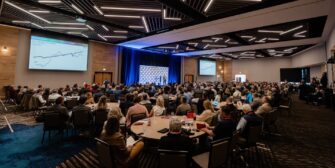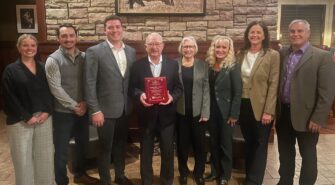3 Family Businesses Honored with Awards from Prairie Family Business Association
Recent News
It is possible: Creating sustainable practices in business can lead to retaining people and increasing profits.
And Heidi Sanborn is someone who helps businesses make it happen.
The California-based founder and executive director of the National Stewardship Action Council since 2015, she will speak at the annual Prairie Family Business Association conference on how family businesses can focus on the “3Ps” of people, planet and profit.
“Heidi comes to the conference as a reflection of what our members are telling us,” said Stephanie Larscheid, executive director of the Prairie Family Business Association. “Many of them have a desire to be a more sustainable business and pay attention to what consumers and employees are wanting from them.”
Sanborn also was the founder and director of the California Product Stewardship Council for 12 years before taking on her current role. The nonprofits are dedicated to reducing waste, increasing recycling and advocating for a circular economy.
The 2022 Prairie Family Business Association annual conference April 28-29 in Sioux Falls is sold out for in-person registration, but you still can register for virtual attendance.
We sat down with Sanborn for a preview of how she plans to help businesses incorporate sustainable practices with take-home strategies they can put to use after the event.
Let’s start by talking about sustainability itself. In this context, what do you mean by it?
It’s a great question because to have a sustainable business you can’t have environmental sustainability separate from the sustainability of your employees. You need happy, passionate employees who want to help the business thrive and do well by doing good. It all goes together. So while we’ll talk about ways you can impact the planet through your business, I’ve seen people in my world burn themselves out, and they can’t help anything if they’re falling apart. So we have to take care of each other in order to do well by doing good. I talk about how to keep your business and family thriving by keeping employees happy and giving them an opportunity to share what could be improved from a sustainability perspective. Make sure you’re open to those ideas and considering them.
What thoughts do you have for a business that wants to become more sustainable but doesn’t know where to start?
I’m a utility geek – I sit on an electric utility board, and I’ve been doing waste management my entire career. So I might start with looking at basic utilities – sanitation, waste, energy are the big ones – and I’d look at those first. What can I do to reduce that bill and conserve while not losing anything businesswise?
If you’re a heavy energy user, what can your business do to reduce that burden of cost? How can your business become more energy independent? And then, look at what materials you use, your existing in-house expertise and how they can help you figure out solutions. You have to have a passion for this, and there are usually a few people in every business that have it. So start a little sustainability team to look at your whole organization, top to bottom, to look at how you address your biggest areas of cost and then how you market that. You want people to associate the company with doing well by doing good, and that will elevate the brand.
This type of culture needs buy-in from the top. What kinds of best practices have you seen from leaders?
I’m the vice president of the Sacramento Municipal Utility District board, which is a 2,200-person organization. We have a 2030 zero carbon plan, and we asked all our employees how are we going to get there. So we opened up channels for them to email ideas, the executives go through all of them and choose some, and people are rewarded if their idea is implemented and works. They might get preferred parking or a discount on an electric car. And in addition, the CEO will do live video chats with anyone who wants to ask questions. It’s open, it increases buy-in and the feeling that we’re all in this together and we will succeed or fail together. That’s a powerful motivator that keeps people loyal.
Are there specific examples you’ll share of family businesses that are making a difference in terms of sustainability?
I’m going to give some examples of family businesses that have thrived and kept the business in the family 100 years or more, doing well by doing good and how they did it and where they started. Where they normally start is in looking at what they do. So, for example, a winery might say it could start using reusable bottles, setting up glass recycling and creating a truly circular economy. That keeps the business thriving and keeps employees happy while doing good.
How important is this to workers? Is sustainability in an employer something they’re seeking?
Everything I’ve seen from employee surveys and the data we get is that this is very, very important, especially for the younger generations. They are not going to join a team they feel is pillaging the planet. They’re just not. They also vote with their dollars. They don’t care about brand name. They want to know that a business is treating people well, doing well by the planet and making a product that is environmentally safe. They love to thrift their clothing because fabric is a big waste stream. They look for reduced packaging. And they don’t plan to stay with a company for life. You have to earn their loyalty as a company they feel a part of.
Click here to connect with the Prairie Family Business Association’s 2022 conference.



